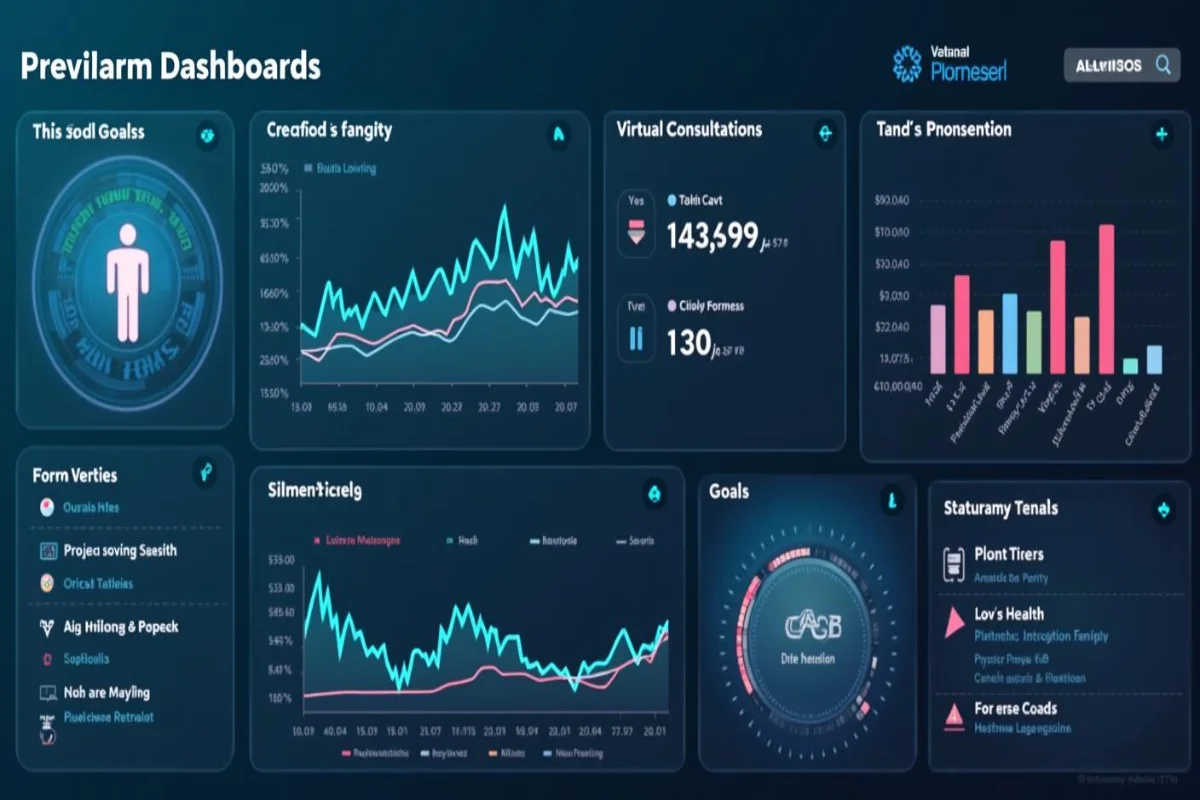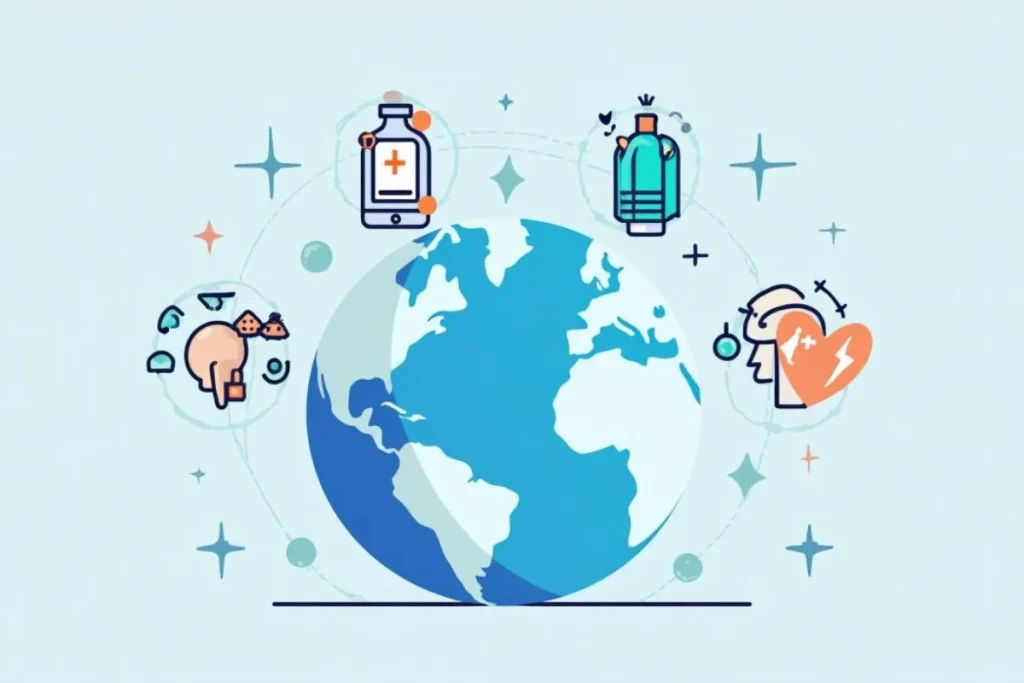The Shift Towards Preventive Healthcare
One of the most impactful global health trends is the increasing focus on preventive healthcare. People are now prioritizing regular check-ups, vaccinations, and lifestyle changes to reduce the risk of chronic diseases.
Governments and organizations worldwide are investing in public awareness campaigns to encourage healthier lifestyles. This shift is not just about individual well-being but also about reducing the economic burden of healthcare systems.
Mental Health – Breaking the Stigma
Mental health is finally receiving the attention it deserves as a key component of global health. The rise in awareness campaigns and accessible resources is helping to break the stigma surrounding mental health issues.
Employers and policymakers are increasingly recognizing the importance of mental well-being, integrating mental health programs into workplaces and communities. This trend highlights a holistic approach to health.
Telemedicine: Revolutionizing Access to Care
Telemedicine has emerged as a critical innovation in global health. By connecting patients with healthcare providers remotely, it bridges the gap for those in underserved regions or with limited mobility.
The convenience of virtual consultations, combined with advancements in diagnostic technologies, is transforming how care is delivered. This trend ensures greater accessibility and efficiency in healthcare systems.
Personalized Medicine and Genomics
Personalized medicine is rapidly advancing, driven by breakthroughs in genomics. This trend allows treatments to be tailored to an individual’s genetic makeup, improving effectiveness and reducing side effects.
As genome sequencing becomes more affordable, it is expected to revolutionize global health. Precision medicine is setting new standards in treating conditions like cancer, heart disease, and rare genetic disorders.

The Fight Against Antimicrobial Resistance
Antimicrobial resistance (AMR) remains a pressing issue in global health. Overuse of antibiotics has led to the emergence of drug-resistant infections, making routine treatments increasingly challenging.
Governments and researchers are focusing on developing new antibiotics and promoting responsible usage. Public health initiatives are educating communities about the risks of AMR and the importance of preventative measures.
Integration of Artificial Intelligence in Healthcare
Artificial intelligence (AI) is shaping the future of global health by enhancing diagnostic accuracy and streamlining administrative tasks. AI-powered tools are helping doctors make data-driven decisions faster than ever before.
From detecting diseases early to personalizing treatment plans, AI is transforming healthcare delivery. This technology is particularly valuable in areas with resource constraints, bridging gaps in access to quality care.
Holistic Approaches to Health and Wellness
The integration of holistic practices into mainstream healthcare is a growing trend. Approaches like yoga, meditation, and alternative therapies are gaining popularity as complements to conventional treatments.
This shift reflects a broader understanding of health as a balance of physical, mental, and emotional well-being. Holistic health initiatives are becoming a staple in healthcare programs worldwide.
Global Vaccination Campaigns Post-Pandemic
Vaccination campaigns have taken center stage in global health following the pandemic. Efforts to distribute vaccines equitably have highlighted both the successes and challenges of international health systems.
Ongoing research into next-generation vaccines aims to tackle emerging infectious diseases. These efforts are a testament to the vital role of vaccines in safeguarding public health on a global scale.

Digital Health Tools Empowering Patients
The rise of digital health tools is empowering patients to take control of their health. Wearable devices, health tracking apps, and online portals are enabling individuals to monitor and manage their well-being more effectively.
This trend aligns with the growing demand for personalized and convenient healthcare solutions. Digital tools are bridging the gap between patients and providers, fostering proactive health management.
Environmental Health – Addressing Climate Impacts
Climate change is increasingly recognized as a global health issue. Rising temperatures, air pollution, and natural disasters are exacerbating health risks, particularly for vulnerable populations.
Public health systems are adapting to address these challenges, focusing on climate resilience and sustainable practices. This intersection of environmental and health policies underscores the urgency of coordinated global action.
Conclusion
The landscape of global health is evolving rapidly, with trends like preventive care, telemedicine, and AI shaping the future. By understanding and adapting to these changes, individuals, governments, and organizations can work together to build healthier societies. Staying informed about these developments is crucial for navigating the challenges and opportunities ahead.
Frequently Asked Questions
- What are the major global health trends in 2025?
- Trends include preventive healthcare, telemedicine, personalized medicine, digital health tools, and climate-focused health policies.
- Why is preventive healthcare gaining importance?
- Preventive care reduces the risk of chronic diseases and lowers healthcare costs by focusing on early detection and healthy living.
- How is telemedicine revolutionizing healthcare?
- Telemedicine improves accessibility by allowing remote consultations and diagnostics, especially in underserved areas.
- What role does AI play in global health?
- AI enhances diagnostics, personalizes treatments, and streamlines healthcare operations for greater efficiency and accuracy.
- How is climate change impacting global health?
- Climate change increases health risks through extreme weather, air pollution, and the spread of vector-borne diseases.
- What is antimicrobial resistance (AMR), and why is it a concern?
- AMR occurs when bacteria become resistant to antibiotics, making infections harder to treat and posing a significant health threat.
- What are digital health tools, and how do they help?
- Digital tools like health apps and wearables empower patients to monitor their health and connect with providers conveniently.
- Why is mental health a global priority?
- Mental health is essential for overall well-being, and addressing it reduces stigma while improving societal productivity.
- How does personalized medicine work?
- Personalized medicine uses genetic data to tailor treatments, ensuring higher effectiveness and fewer side effects.
- What are the benefits of global vaccination campaigns?
- Vaccination campaigns prevent infectious diseases, improve immunity, and enhance public health globally.



